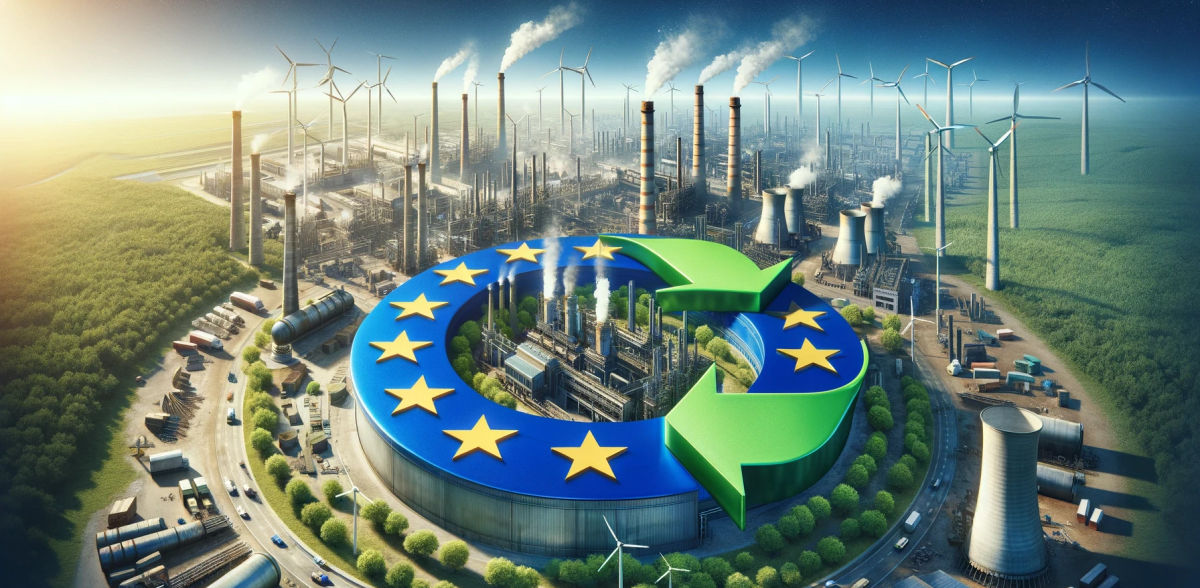Industrial areas become industrial hubs for the Circular Economy
The European Union wants to be the first digitally-led, climate-neutral and sustainable Circular Economy
Advertisement
In a functioning circular economy, different sectors must work together and symbioses between different technologies are a key prerequisite. To achieve this, systemic change is necessary. A consortium of 35 organizations from various countries in Europe is working on this in the Horizon Europe Innovation Action project entitled "Sustainable Circular Economy Transition: from Industrial Symbiosis to Hubs for Circularity (IS2H4C)" under the leadership of the University of Twente (NL). The four-year project aims to establish four industrial hubs: in the Netherlands, Turkey, the Basque Country and Germany. Fraunhofer UMSICHT is contributing its expertise in the field of methanol synthesis and the synthesis of dicarbamates from CO2 to the Turkish hub.
The European Union wants to be the first digitally-led, climate-neutral and sustainable Circular Economy. To achieve this, different industries need to work together. Therefore, the "ISH4C" project focuses on exploring the potential of industrial symbioses and their gradual implementation in selected industrial hubs in the context of green transformations. The focus is on innovative technologies such as carbon capture and electrolysis. The hubs are characterized by resource efficiency, renewable energy production, waste prevention and the promotion of industrial, urban and rural symbiosis. For four years, IS2H4C will implement its innovative model in four important hubs in Europe: Hub Twente in the Netherlands (in collaboration with H2 Hub Twente and UT), Basque Hub in Northern Spain, Industriepark Höchst in Germany and Izmir-Manisa Hub in Turkey. The project volume amounts to 23.5 million euros.
Turkish industrial hub
The Izmir-Manisa region is home to companies in the oil and gas industry as well as the household appliance industry, which are located near an industrialized port area on the Aegean coast. The planned cooperation includes several steps: firstly, the production of green hydrogen by electrolysis using renewable energy and the capture of carbon dioxide from the oil refinery by carbon capture through adsorption. This green hydrogen and the captured carbon dioxide are then used to produce eco-methanol. The captured carbon dioxide is used to produce isocyanate-free polyurethane, a more environmentally friendly alternative to conventional polyurethane.
The researchers at Fraunhofer UMSICHT are contributing their expertise in the field of methanol synthesis and the synthesis of decarbamates, both from CO2. One aim is to develop a methaneless synthesis based on CO2/H2 or CO2-rich synthesis gases. Laboratory and pilot plants for methanol synthesis as well as the necessary downstream processes for separating the water/methanol mixtures and analyzing the products and by-products will be used. Furthermore, the synthesis of the dicarbamates in high-pressure reactors and the optimal reaction conditions with regard to the catalysts used and experimental parameters will be developed. "We are delighted to be involved in this pioneering project. One of the biggest challenges is to scale up our technologies and integrate them at the industrial site," explains Nils Mölders, Head of Product Development at Fraunhofer UMSICHT.
New standard for a greener future
The project aims to set a new standard for sustainable regional development models and pave the way for a cleaner and greener future. Its implementation will have a profound impact on industrial practices, societal well-being and environmental sustainability, making it a pioneering initiative on Europe's path towards a circular economy. "IS2H4C" also facilitates the market penetration of circular economy hubs through novel financing models and social innovation approaches that unlock public and private investment.
Other news from the department science
Most read news
More news from our other portals
See the theme worlds for related content
Topic world Synthesis
Chemical synthesis is at the heart of modern chemistry and enables the targeted production of molecules with specific properties. By combining starting materials in defined reaction conditions, chemists can create a wide range of compounds, from simple molecules to complex active ingredients.

Topic world Synthesis
Chemical synthesis is at the heart of modern chemistry and enables the targeted production of molecules with specific properties. By combining starting materials in defined reaction conditions, chemists can create a wide range of compounds, from simple molecules to complex active ingredients.



























































